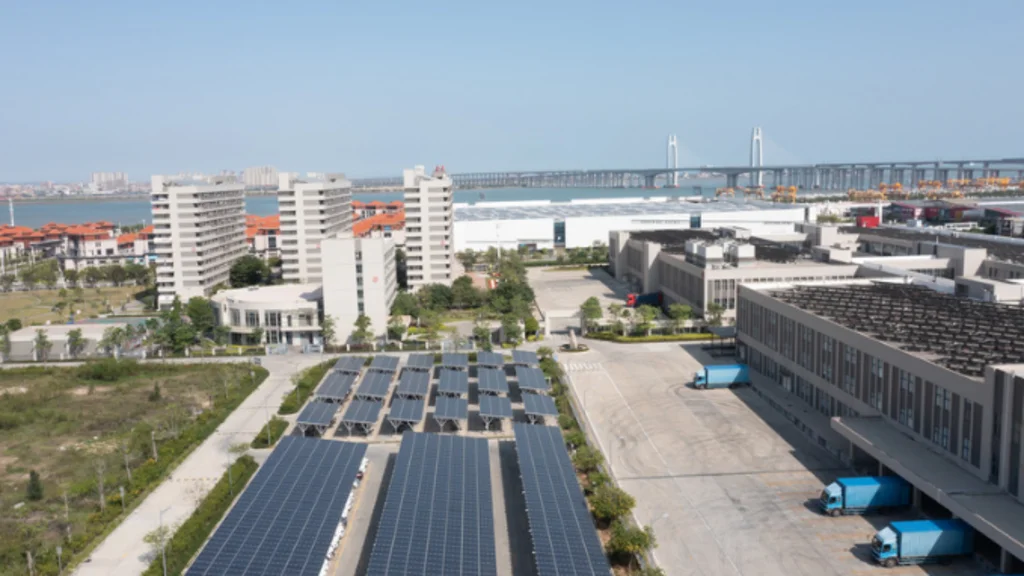Have you ever looked at your driveway and wondered if it could do more than just shelter your car? Imagine turning that everyday parking space into a clean energy generator; that’s exactly what solar carports offer.
More than just a canopy with panels on top, solar blend functionality and sustainability, making them a rising star in the residential and small business solar movement. Whether you own an electric vehicle (EV) or simply want to reduce your power bills, these dual-purpose systems are worth exploring.
What Are Solar Carports and How Do They Work?
At their core, carports are elevated structures designed to hold solar panels above vehicles. Think of them as mini solar power stations that also shield your car from the sun, rain, and snow.
Unlike rooftop solar, which depends on roof orientation and tilt, this carports provide installers with total control over panel angles, thereby maximizing energy output. This flexibility often leads to improved efficiency, especially when south-facing roof space is limited or shaded.
Real-World Example:
One of our clients in Phoenix, AZ installed a 6 kW solar carport with a built-in EV charger. Within just eight months, the system generated enough power to offset 70% of their home’s energy needs without touching the roof.
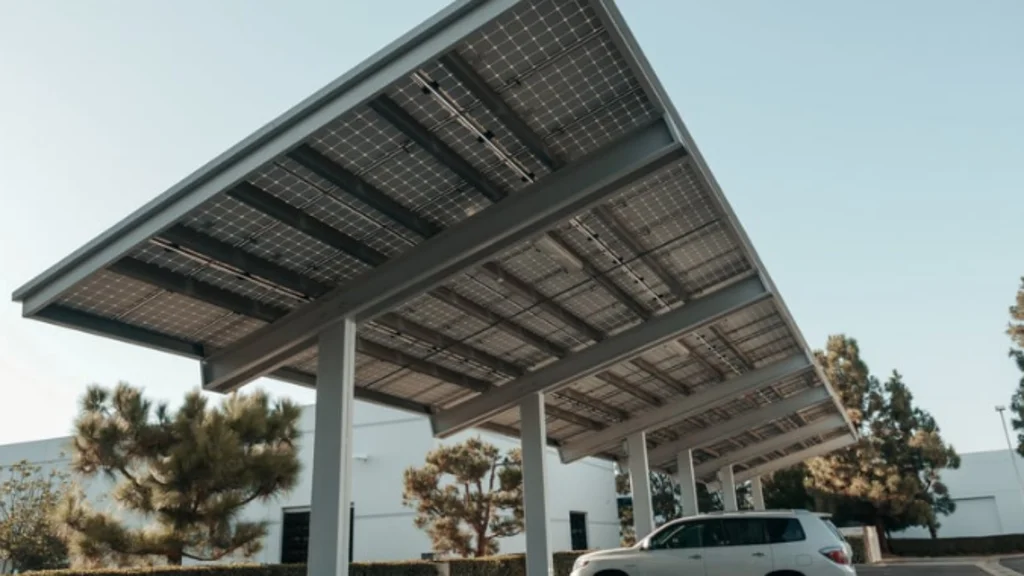
Why Homeowners and Small Businesses Are Choosing Solar Carports
More than a trend, solar solve real-world problems and offer long-term gains. Here’s why more people are investing in them:
Dual Functionality
You get both a car shelter and a renewable energy generator—ideal for urban homeowners or commercial parking lots.
Better Panel Performance
carports often outperform rooftop systems due to optimized tilt and fewer shading issues.
EV Charging Integration
Many models come equipped with solar EV charging stations, enabling clean, off-grid charging at home or work.
Expandable and Scalable
Start small with a one-car port, or go big for multi-bay systems that can power entire facilities.
No Roof Hassles
No need to worry about roof condition, pitch, or future leaks—everything is freestanding and accessible.
According to the U.S. Department of Energy, a well-positioned solar carport can generate about 8 to 10 kWh per square meter per day, depending on your location.
Solar Carports vs Rooftop Solar: Which One’s Better?
While both systems harness sunlight, their use cases differ:
| Feature | Rooftop Solar | Solar Carports |
| Location | Roof-bound | Freestanding structure |
| Tilt Control | Limited by roof pitch | Fully customizable tilt |
| Maintenance Access | More difficult | Easier access for cleaning |
| Structure Cost | Lower upfront | Higher due to frame build |
| EV Charging | Add-on | Often integrated |
So, which is better? It depends. If you have limited roof space or need covered parking, carports offer unmatched versatility.
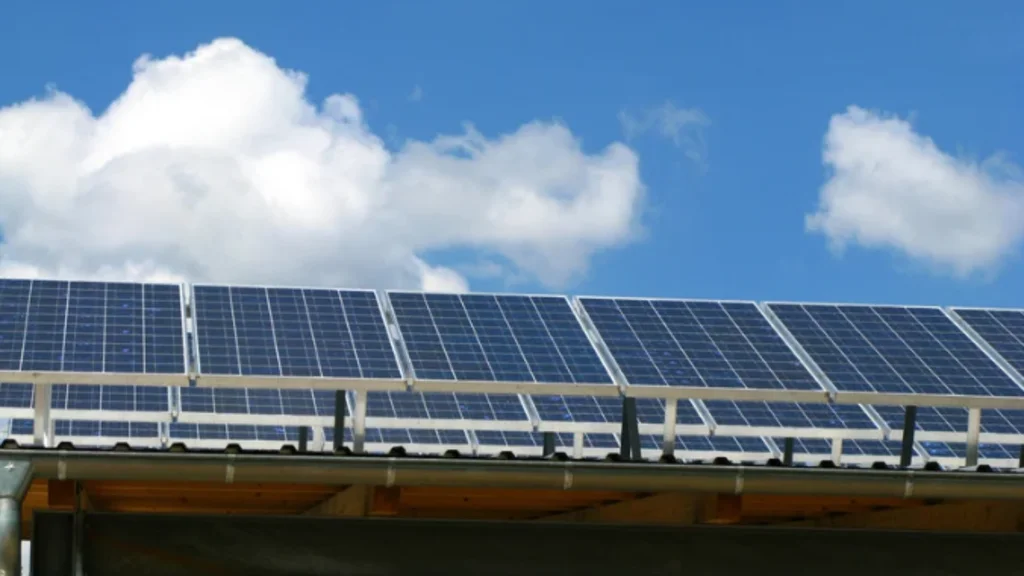
What Does It Cost to Install a Solar Carport?
The cost of a solar carport system depends on several factors, including system size, structural materials, panel quality, and electrical components like inverters or EV chargers. But here’s a realistic breakdown:
Average Price Range
- Residential (1–2 cars): $10,000–$25,000
- Commercial/Multi-bay: $30,000–$100,000+
This includes the panels, steel frame, installation, wiring, and optionally, battery storage or EV integration. According to EnergySage, a 5 kW solar carport might cost about $15,000–$18,000 before incentives.
Don’t Forget the Incentives:
Thanks to the Federal Solar Investment Tax Credit (ITC), homeowners and businesses can deduct up to 30% of installation costs from their taxes. Many states also offer local rebates, which can further reduce your out-of-pocket expenses.
Pro Tip: Before signing a contract, ask your installer for a side-by-side ROI analysis comparing rooftop vs solar carport. You might be surprised by the long-term savings.
Click here : Solar pool heater.
Best Smart Pairings: Inverters, EV Chargers, and Batteries
Solar carports aren’t just about panels—they work best when paired with smart tech:
Smart Inverters
Inverters convert DC electricity from panels into usable AC power. Modern inverters come with features like:
- Real-time monitoring via mobile apps
- Automatic fault detection
- Compatibility with home batteries
Brands like Solar Edge and Enphase are leading in this space.
Solar Battery Storage
Adding a battery such as a Tesla Powerwall or LG Chem RESU, lets you store excess energy for nighttime use or during outages. This is particularly useful if you live in areas with time-of-use rates or frequent grid disruptions.
EV Charging Stations
A key benefit of carports is seamless solar EV charging. Depending on your charger type:
- Level 1 (120V) is slow but low-cost
- Level 2 (240V) provides full EV charge in 4–8 hours
- Level 3 (DC fast charging) is rare in home setups due to cost and power requirements
According to NREL (National Renewable Energy Laboratory), integrating solar with EV charging can reduce transportation emissions by up to 70% compared to grid-powered vehicles.
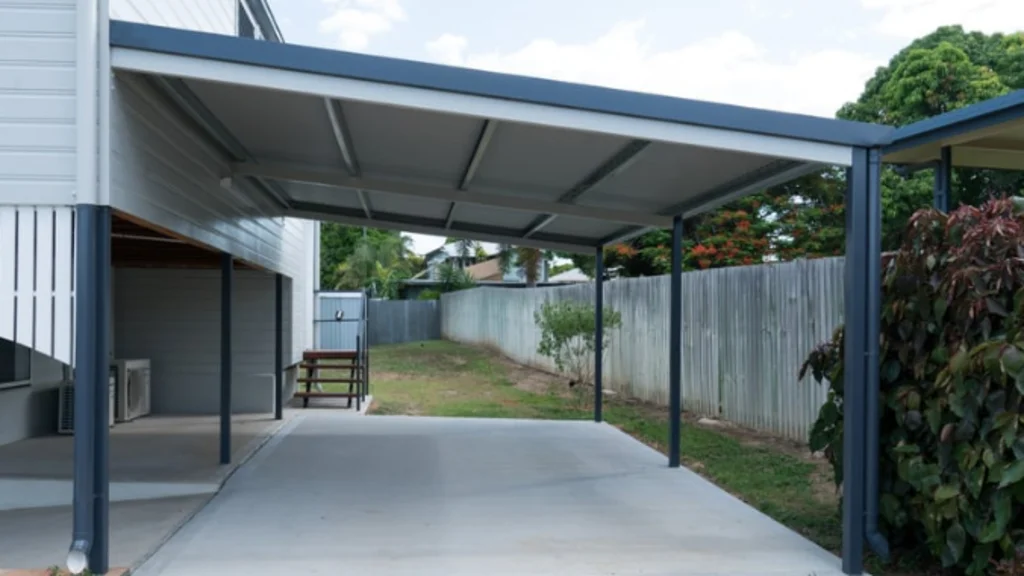
Maintenance Tips to Maximize Solar Carport Performance
Keeping your solar carport clean and functional doesn’t require daily effort, but a little seasonal care goes a long way. Here’s what matters most:
Keep Panels Clean
Dust, pollen, bird droppings, and leaves can reduce output by up to 20%. Clean panels every 3–6 months using a soft brush and water. Avoid high-pressure hoses or abrasive cleaners.
Check for Shade Growth
Trees or new structures nearby may begin shading your panels over time. Trim branches and monitor shading patterns, especially in fall and winter.
Inspect Wiring and Mounts
Look for loose bolts, rust, or rodent-chewed cables. If you’re unsure, hire a licensed solar technician once a year to inspect your setup.
“We didn’t realize how much we were losing until the inverter flagged an alert,” one homeowner shared. “After a $200 inspection and a quick fix, we saw a 15% bump in performance.”
Monitor Output Regularly
Most systems come with apps that let you track daily energy production. A sudden drop in output could indicate dirt, shading, or inverter issues.
Visit here: 1000 watt solar panels.
Are This Carports Right for You?
Let’s break it down by user type
For Homeowners
If you want solar but your roof isn’t ideal—due to shape, shade, or structure—a solar carport gives you energy independence without roof interference. Plus, it adds curb appeal and increases property value.
For Small Business Owners
Carports can turn idle parking space into an energy-generating asset. Install them over your customer lot or employee parking to slash electricity bills and promote sustainability. Some businesses even add branded signage or LED lighting to boost visibility.
For EV Owners
No more relying on the grid to power your vehicle. A solar carport with integrated EV charging ensures you’re fueling your drive directly from the sun.
The Future of Driveways Is Solar
Solar are more than a trend, they’re a practical, forward-thinking investment. Whether you’re a homeowner looking to lower your electric bill, a business owner seeking to optimize parking spaces, or an electric vehicle (EV) driver aiming for energy independence, solar offer flexibility, performance, and a clear return on investment.
With incentives still in place and panel technology continually improving, there has never been a better time to explore this dual-purpose solar solution.
If your driveway or parking lot is sitting idle, it’s time to put it to work. A solar carport could be generating clean power and charging your EV right now. Book a solar carport consultation today and discover how much you could save while making your space smarter.
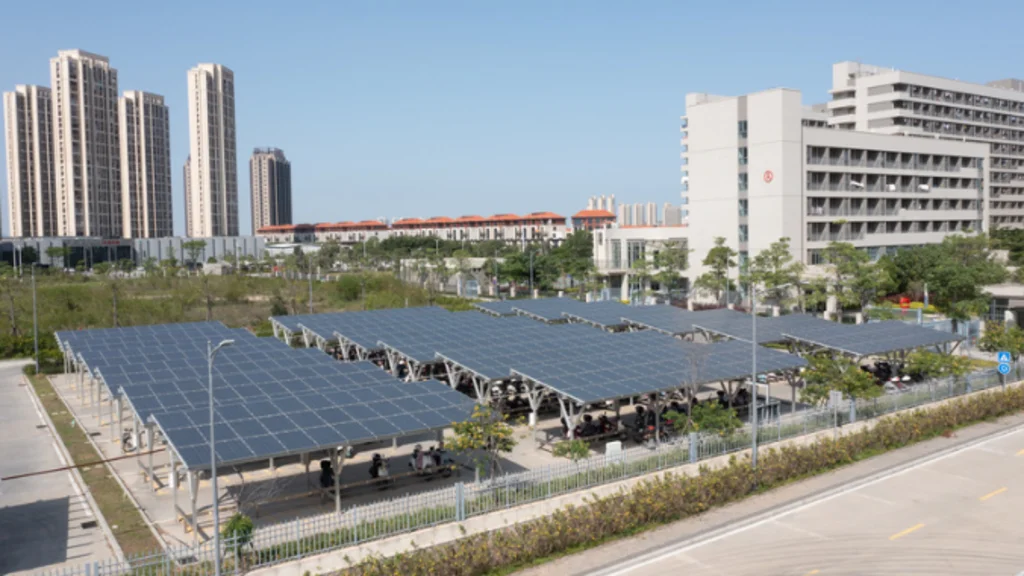
FAQs
What is the process for installing a solar carport?
Solar carport installation typically involves designing the structure, securing permits, pouring foundations, and mounting solar panels. The process can take 2–4 weeks depending on size and complexity.
Is there a solar carport diagram to help visualize the setup?
Yes, most installers provide a diagram that shows how the panels, wiring, battery storage, and EV charger integrate into the structure. These diagrams help homeowners understand energy flow and component placement.
Can a solar carport include a battery system?
Absolutely. Solar carports can be paired with lithium-ion battery systems to store excess power for nighttime or backup use. This setup increases energy independence and is ideal for off-grid or high-rate utility areas.
How does a solar carport roof differ from a regular carport roof?
Unlike standard metal or shingle roofs, a solar carport roof is designed to hold photovoltaic panels. It must be strong enough to support the panel weight and tilted at an optimal angle for sun exposure.
Do solar carports come with a charging port for electric vehicles (EVs)?
Yes, many carports include built-in EV charging ports, typically Level 2 chargers. This allows direct solar-powered charging, reducing your reliance on grid electricity for your vehicle.

